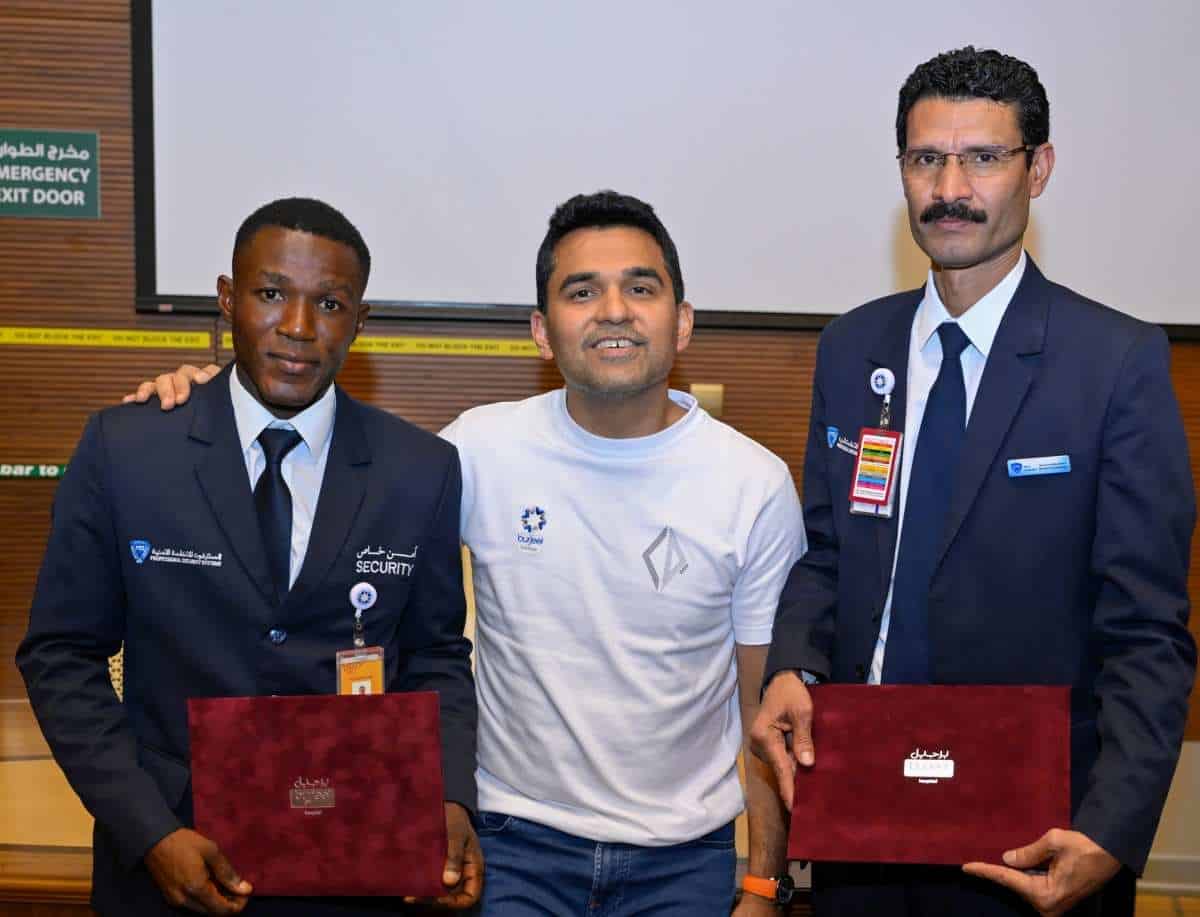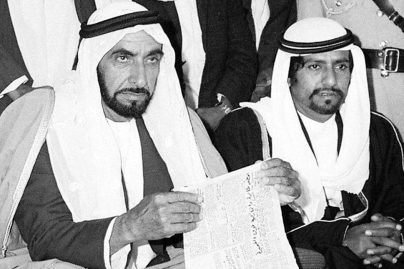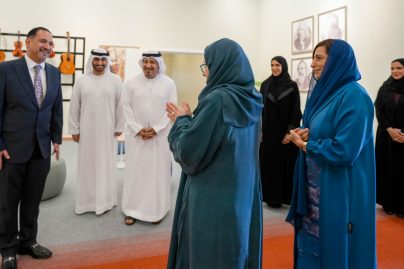Burjeel Hospital rewarded its security team with AED 50k, who saved the life of a woman with their actions
Mon 09 Oct 2023
A quick response by the staff at Abu Dhabi’s Burjeel Hospital proved critical in saving the life of the patient who had suffered cardiac arrest caused by blood clots in her lungs.
Abu Dhabi: In a heartwarming display of gratitude, the management of Burjeel Hospital, Abu Dhabi, rewarded the vigilant security officer, Faizal Khan, and his team with AED 50,000. This remarkable act of recognition stems from their quick intervention, for saving the life of the 23-year-old Emirati woman.
The security guard’s prompt action and the coordinated team response played a vital role in ensuring the young woman received the urgent medical attention she desperately needed. The hospital management recognized the significance of these acts of heroism and took it upon themselves to acknowledge and reward these unsung heroes. Dr. Shamsheer Vayalil, Founder and Chairman of Burjeel Holdings, presented the token of appreciation to the employees in an event organized at the hospital.
Timely Action Saves the Life of a 23-year-old Emirati Woman Who Lost Consciousness Outside Abu Dhabi Hospital
In a remarkable display of swift and coordinated action, a 23-year-old Emirati woman’s life was saved outside a hospital in Abu Dhabi after she fell unconscious beside her car. The incident unfolded when the young patient suddenly lost consciousness after suffering a pulmonary embolism. The heroic efforts of Burjeel Hospital’s security guards, emergency room (ER) staff, and a team of doctors ended up saving F. Al Hosani’s life and averted what could have been a tragic incident.
Faizal Khan, Security Officer at Burjeel Hospital, recalls the incident began when the hospital’s vigilant security guards found the young woman to be unconscious and unresponsive. “Suddenly, I got a message from the walkie-talkie that a patient had collapsed close to the ER. We immediately instructed the control room operator to call a Code Magenta,” he said.
Moments after the Code Magenta, also known as the rapid response alert, was sounded in the hospital, the ER staff rushed to the scene with essential life-saving equipment.
According to Mary Joy, Emergency Nurse, it was a normal day in the ER when the alert was announced. “We ran outside with triage nurses and took the stretcher with us. We found the patient unresponsive and lying on the road. We got the patient on the stretcher, and we moved her quickly,” she said.
Resuscitated for 10 Minutes
The ER staff swiftly transported the patient to the resuscitation room in the emergency department, where a team of emergency medicine professionals was ready to offer her immediate care. According to Dr. Wissam Al Sahli, Consultant, Interventional Cardiology, Ms. Al Hosani suffered a cardiac arrest and the team initiated advanced cardiac life support measures. After being resuscitated for 10 minutes, she was stabilized, but her condition was critical.
Dr. Wissam said, “We rushed the patient for an emergency coronary angiogram to check if it was a heart attack because that would need to be fixed as soon as possible. It revealed everything was within normal limits.”
Even after resuscitating her, the medical team was struggling to maintain her blood pressure and her oxygen saturation, both of which were extremely low. When suspicions were raised about a pulmonary embolism (a blood clot in her lungs), Ms. Al Hosani was taken for an emergency CT scan of her lungs.
According to Dr. Mohamed Almarzooqi, Consultant Interventional Neuroradiology, Interventional Radiology & HOD, without wasting any time, the team rushed to get her an emergency CT scan. “The CT scan of her lungs showed multiple pulmonary emboli (clots) in the lungs, which were affecting the oxygenation of the body, her blood pressure and putting a huge strain on the heart. The team was also on standby to aspirate the blood clot,” said Dr. Almarzooqi.
After a quick emergency meeting, the medical team decided to administer clot-busting medication to dissolve the embolism. Their expertise and quick decision-making proved crucial in stabilizing the patient’s condition. Within 1-2 hours, her vital signs gradually improved. There was a huge improvement in her blood pressure and oxygen saturation. Ms. Al Hosani was on artificial ventilation during that time as she was unable to breathe by herself. The following day, once her vitals stabilized, the team was able to wean her off the ventilator and she regained consciousness. She soon recovered and was discharged home five days later.
According to the medical team, which also included Dr. Nehad Nabil Abdelmoneim Halawa, Specialist Intensive Care & HOD, and Dr. Mohamed Mostafa Mohamed Ibrahim, Specialist Emergency Medicine, the patient was resuscitated on time and was lucky to receive timely medical attention.
For Ms. Al Hosani, the whole episode is a blur. That morning, the young woman had come to the hospital as she was not feeling well. After that, she remembers waking up in the hospital, with the doctors and her family explaining what happened to her.
“I am grateful to the Almighty to be alive. I was not feeling well but I did not expect it to lead to such a serious condition. I am thankful to the entire team at Burjeel Hospital that took good care of me,” said Ms. Al Hosani.
Understanding Pulmonary Embolism
According to Dr. Wissam, pulmonary embolism can be caused due to a variety of factors including a recent surgery, reduced mobility related to travel whether by air or car, or hormonal pills.
“She will require further follow-up to make sure there is no other clotting disturbance, which is a risk factor after pulmonary embolism,” he said.

 May 01 2024
May 01 2024













